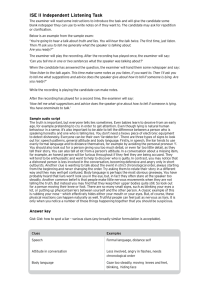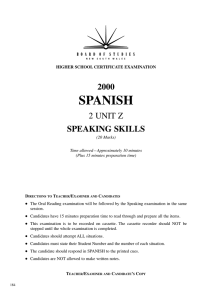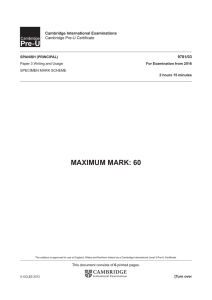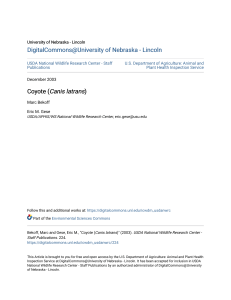Session admin notes GESE Spain
Anuncio
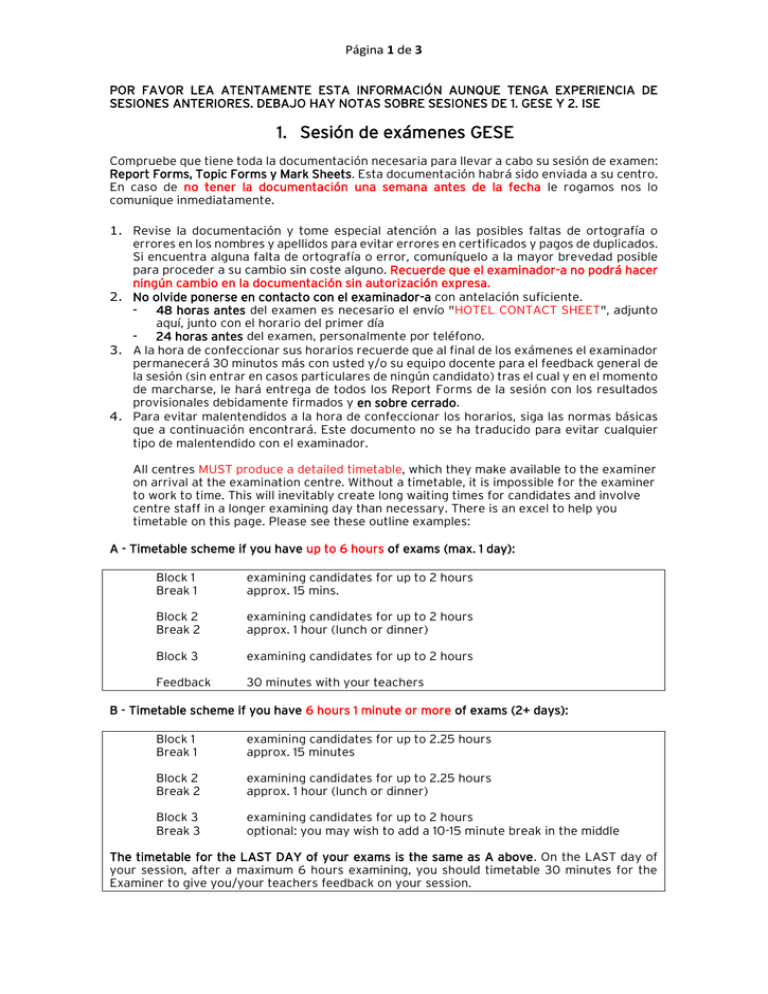
Página 1 de 3 POR FAVOR LEA ATENTAMENTE ESTA INFORMACIÓN AUNQUE TENGA EXPERIENCIA DE SESIONES ANTERIORES. DEBAJO HAY NOTAS SOBRE SESIONES DE 1. GESE Y 2. ISE 1. Sesión de exámenes GESE Compruebe que tiene toda la documentación necesaria para llevar a cabo su sesión de examen: Report Forms, Topic Forms y Mark Sheets. Esta documentación habrá sido enviada a su centro. En caso de no tener la documentación una semana antes de la fecha le rogamos nos lo comunique inmediatamente. 1. Revise la documentación y tome especial atención a las posibles faltas de ortografía o errores en los nombres y apellidos para evitar errores en certificados y pagos de duplicados. Si encuentra alguna falta de ortografía o error, comuníquelo a la mayor brevedad posible para proceder a su cambio sin coste alguno. Recuerde que el examinador-a no podrá hacer ningún cambio en la documentación sin autorización expresa. 2. No olvide ponerse en contacto con el examinador-a con antelación suficiente. - 48 horas antes del examen es necesario el envío "HOTEL CONTACT SHEET", adjunto aquí, junto con el horario del primer día - 24 horas antes del examen, personalmente por teléfono. 3. A la hora de confeccionar sus horarios recuerde que al final de los exámenes el examinador permanecerá 30 minutos más con usted y/o su equipo docente para el feedback general de la sesión (sin entrar en casos particulares de ningún candidato) tras el cual y en el momento de marcharse, le hará entrega de todos los Report Forms de la sesión con los resultados provisionales debidamente firmados y en sobre cerrado. 4. Para evitar malentendidos a la hora de confeccionar los horarios, siga las normas básicas que a continuación encontrará. Este documento no se ha traducido para evitar cualquier tipo de malentendido con el examinador. All centres MUST produce a detailed timetable, which they make available to the examiner on arrival at the examination centre. Without a timetable, it is impossible for the examiner to work to time. This will inevitably create long waiting times for candidates and involve centre staff in a longer examining day than necessary. There is an excel to help you timetable on this page. Please see these outline examples: A - Timetable scheme if you have up to 6 hours of exams (max. 1 day): Block 1 Break 1 examining candidates for up to 2 hours approx. 15 mins. Block 2 Break 2 examining candidates for up to 2 hours approx. 1 hour (lunch or dinner) Block 3 examining candidates for up to 2 hours Feedback 30 minutes with your teachers B - Timetable scheme if you have 6 hours 1 minute or more of exams (2+ days): Block 1 Break 1 examining candidates for up to 2.25 hours approx. 15 minutes Block 2 Break 2 examining candidates for up to 2.25 hours approx. 1 hour (lunch or dinner) Block 3 Break 3 examining candidates for up to 2 hours optional: you may wish to add a 10-15 minute break in the middle The timetable for the LAST DAY of your exams is the same as A above. On the LAST day of your session, after a maximum 6 hours examining, you should timetable 30 minutes for the Examiner to give you/your teachers feedback on your session. Página 2 de 3 Basic timetable notes: enter candidate names from lower to higher grades within each block of examining avoid long breaks between morning and afternoon sessions give a copy of the timetable (and any updates) to the steward and examiner Detailed session organisational notes Calculate the total number of hours examining by multiplying the total number of candidates at each grade by the minutes applicable to each grade and adding them together. If you work at an academy and have chosen days before the end of the school courses, please remember that your students may be less flexible about examination times. You may need to consult them and confirm that the time you allocate is suitable, e.g. can adults only attend during the evening, or would they be available during their lunchtime? Consider their travelling time and avoid late exam times for younger candidates where possible. The maximum time an examiner can examine (and/or give feedback) is 6 hours and 30 minutes a day (without counting breaks). Breaks are necessary to ensure that the Examiner remains fresh and can give the same attention to the first as to the last candidate in the day. As in example A above, you should timetable a break after about two hours’ examining and another break after about four hours’ examining, and timetable 30 minutes at the end for the Examiner to give you feedback on your session. As in example B above, you should timetable a break after about two hours’ examining and another break after about four hours’ examining. On the LAST day of your session, with a maximum 6 hours examining, you should also timetable 30 minutes at the end for the Examiner to give you feedback on your session. You should not leave gaps on your timetable between one candidate and the next. Wherever possible, start with lower grades and work upwards. There will of course be some circumstances where a grade out of sequence is unavoidable. However, as a basic principle avoid mixing grades. It makes the examiner’s job easier if you group grades together. If you have a large number of candidates at a particular level, you may wish to help avoid the monotony of the same level for excessive periods by timetabling a block of candidates at a different grade. However, please remember the basic principle of working from low to high grades as far as possible. If the examiner asks for minor changes to the timetable to accommodate a personal preference and if you are willing to make alterations without upset to your school routine and candidates, then changes can be made to the timetable. Wherever possible, please try to avoid long breaks between the morning and afternoon sessions. In most cases, the examiner will not be able to return to the hotel which may impact on the Examiner’s performance by making the working day longer and excessively tiring. Trinity tries to ensure that in all circumstances the examiner’s day from leaving the hotel to returning to it does not exceed nine hours. Your co-operation in this respect will be much appreciated by the examiner. If examiners spend extended periods at your centre, please note that they can only work for six consecutive days. These arrangements should not normally include any examining on weekends and centres wishing to examine on a Saturday/Sunday should first check with Trinity or the area/national consultant. Decide how best to make sure your candidates remember the day and time for their examination and give them reminders as necessary. Appointment slips are available. Examining the right candidate: the person stewarding candidates into the exam room should give the Examination Report Forms to the candidates as they enter for their exam. This is useful for verifying the name of the candidate in case of last-minute timetable changes. Unavoidable timetable changes may occur. Please inform the examiner of any changes. e.g: if one candidate is absent or late, another candidate may take his or her place. IMPORTANT see note 13 above. A copy of the timetable should be given to the examiner and any alterations explained. Página 3 de 3 Please ensure that the examination room you select is quiet, well-lit and well-ventilated. Waiting candidates should remain in a room near to the exam room until they are called by the steward. Please supply the examiner with fresh water during the examining session. This is much appreciated. Candidates who have finished their examinations should not be allowed to speak to waiting candidates as they can often give misleading information which is not to the waiting candidates’ benefit. 5. Por norma general recomendamos, siempre que sea posible, recoger al examinador-a del hotel, lo que le evitará retrasos innecesarios. De no ser posible, le rogamos indique al examinador la mejor forma de desplazarse a su centro. 6. En caso de no poder establecer comunicación con su consultor, le recordamos que tiene a su disposición nuestra línea de atención al centro Trinity 902 100 430. 7. Si tiene alguna duda a la hora de presentar algún tipo de reclamación, le rogamos lea detenidamente ese apartado en nuestra página web donde también encontrará nuestra política de protección de datos. No obstante, recuerde que puede hacer uso también de nuestra política de repetición de examen en caso de presentado suspenso. 8. Para que la organización de su sesión sea todo un éxito, asegúrese de estar usando el GESE guide for teachers vigente, o consulte en nuestra página web, allí encontrará toda la información necesaria: What is GESE? http://www.trinitycollege.co.uk/site/?id=368 9. Recuerde que los candidatos mayores de 14 deberán acreditar su identidad mediante un DNI, PASAPORTE o documento identificativo institucional con foto.
